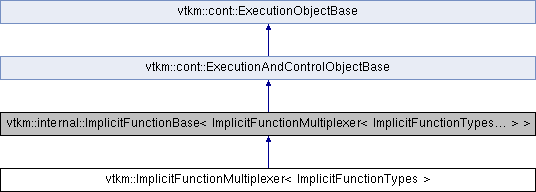Implicit function that can switch among different types. More...
#include <ImplicitFunction.h>

Public Types | |
| using | Scalar = typename Superclass::Scalar |
| using | Vector = typename Superclass::Vector |
Public Member Functions | |
| ImplicitFunctionMultiplexer ()=default | |
| template<typename FunctionType > | |
| VTKM_EXEC_CONT | ImplicitFunctionMultiplexer (const vtkm::internal::ImplicitFunctionBase< FunctionType > &function) |
| VTKM_EXEC_CONT Scalar | Value (const Vector &point) const |
| VTKM_EXEC_CONT Vector | Gradient (const Vector &point) const |
Private Types | |
| using | Superclass = vtkm::internal::ImplicitFunctionBase< ImplicitFunctionMultiplexer< ImplicitFunctionTypes... > > |
Private Attributes | |
| vtkm::exec::Variant< ImplicitFunctionTypes... > | Variant |
Detailed Description
template<typename... ImplicitFunctionTypes>
class vtkm::ImplicitFunctionMultiplexer< ImplicitFunctionTypes >
Implicit function that can switch among different types.
An ImplicitFunctionMultiplexer is a templated ImplicitFunction that takes as template arguments any number of other ImplicitFunctions that it can behave as. This allows you to decide at runtime which of these implicit functions to define and compute.
For example, let's say you want a filter that finds points either inside a sphere or inside a box. Rather than create 2 different filters, one for each type of implicit function, you can use ImplicitFunctionMultiplexer<Sphere, Box> and then set either a Sphere or a Box at runtime.
To use ImplicitFunctionMultiplexer, simply create the actual implicit function that you want to use, and then set the ImplicitFunctionMultiplexer to that concrete implicit function object.
Member Typedef Documentation
◆ Scalar
| using vtkm::ImplicitFunctionMultiplexer< ImplicitFunctionTypes >::Scalar = typename Superclass::Scalar |
◆ Superclass
|
private |
◆ Vector
| using vtkm::ImplicitFunctionMultiplexer< ImplicitFunctionTypes >::Vector = typename Superclass::Vector |
Constructor & Destructor Documentation
◆ ImplicitFunctionMultiplexer() [1/2]
|
default |
◆ ImplicitFunctionMultiplexer() [2/2]
|
inline |
Member Function Documentation
◆ Gradient()
|
inline |
◆ Value()
|
inline |
Member Data Documentation
◆ Variant
|
private |
The documentation for this class was generated from the following file:
 1.8.17
1.8.17